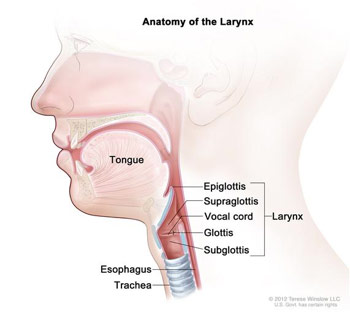- Signs and Symptoms of Laryngeal Cancer - December 13, 2013
 Cancer is the uncontrollable growth of cells in a specific area of the body. Usually, cells replicate and then die; however, malignant (cancer) cells do not die but continue to multiply. Laryngeal cancer, sometimes called larynx cancer, is a cancer of the larynx, or voice box. The larynx is separated into three regions: the supraglottis, glottis, and/or subglottis. Each of these regions contributes in some way to help the body breathe, talk, and swallow. Larynx cancer is primarily found in the glottis, where the vocal cords are located. It commonly affects the most superficial tissue layer, the epithelial layer, which is mainly made up of squamous epithelial cells. The over production of these cells creates problems which makes it difficult for them to go about their everyday activities.
Cancer is the uncontrollable growth of cells in a specific area of the body. Usually, cells replicate and then die; however, malignant (cancer) cells do not die but continue to multiply. Laryngeal cancer, sometimes called larynx cancer, is a cancer of the larynx, or voice box. The larynx is separated into three regions: the supraglottis, glottis, and/or subglottis. Each of these regions contributes in some way to help the body breathe, talk, and swallow. Larynx cancer is primarily found in the glottis, where the vocal cords are located. It commonly affects the most superficial tissue layer, the epithelial layer, which is mainly made up of squamous epithelial cells. The over production of these cells creates problems which makes it difficult for them to go about their everyday activities.
What are the signs and symptoms of laryngeal cancer?
The symptoms of laryngeal cancer can vary, but usually include:
- a hoarse voice or other voice changes
- a lump in the neck
- a sore throat or trouble swallowing
- a feeling that something is lodged in the throat
Some less common symptoms include:
- a recurring cough
- stridor, a high-pitched wheezing sound indicative of a narrowed or obstructed airway
- an earache that doesn’t go away
What is the likelihood of these symptoms being due to larynx cancer?
Although these symptoms can be present in laryngeal cancer, they could also be the result of another health problem. While many of these symptoms overlap with those of a common cold, if they persist, then medical attention is advised. People who smoke or drink alcohol are more susceptible to this cancer. These people, especially those who partake in both, should take extra precaution in recognizing these signs early, for they could be linked to an early stage of laryngeal cancer.
Is it possible for the symptoms to go unnoticed?
It is highly unlikely that an individual would not recognize any of these symptoms. They will almost always have at least one, if not more, of them. The most important thing to recognize is that if any symptom listed persists for more than two weeks, evaluation including laryngoscopy should be sought immediately.
What is the treatment for laryngeal cancer and what are the chances of recovery?
Treatment is determined by several different factors: the stage of cancer, location and size of tumor, the patient’s general health, and where the cancer has spread. Depending on the stage, there is usually a combination of surgery, radiation and chemotherapy that is recommended and tailored to the individual patient’s case.
The earlier that cancer is detected, the higher the likelihood of survival. On January 1, 2010, in the United States, there were approximately 89,029 individuals alive, who were under remission or undergoing treatment.

If a person suspects that they have laryngeal cancer, what steps should they take?
If a person has one or more of these symptoms, they should immediately contact a head and neck oncologist and get evaluated. The longer a person waits, the more likely they are to allow the cancer and symptoms to worsen, as opposed to stalling its growth or even stopping it with early treatment.



